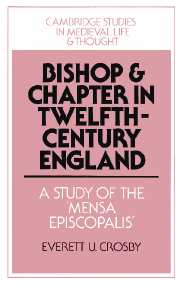2 - The episcopal church in the kingdom
Published online by Cambridge University Press: 04 December 2009
Summary
The development of the Anglo-Norman church was shaped by three fundamental changes which occurred in the course of the tenth and eleventh centuries and which had far-reaching effects on both the clerical and the lay society of the time. In the first place, the underlying economic revolution, based on a rising population and improvements in agriculture, accompanied by a surplus in production, a revived money economy, and a growing intensity in commercial ventures, led to a redistribution of wealth which affected almost all of the cathedral churches. Greater wealth meant more donations from the lay sector, but more competition for their control, and this in turn, required more care in handling them. Enriched endowments usually led to increased expenses and often to greater debts as a result. The growth of towns, moreover, had a further effect in that all of the cathedral churches developed in an urban environment. Although monastic Christianity was a rural phenomenon which marked its greatest success in the period before the twelfth century, in England, where half the sees possessed convents of monks, the cathedral priories, like the secular chapters, came to be closely tied to town life, town regulations, and town wealth. As a consequence, the economic changes had a direct impact on the structure of the mensa, as well as on the wider relationship between regular and secular clergy.
In the second place, the cluster of changes brought about by the reform movement within the church had profound consequences for every level of society throughout the Latin West.
- Type
- Chapter
- Information
- Bishop and Chapter in Twelfth-Century EnglandA Study of the 'Mensa Episcopalis', pp. 30 - 47Publisher: Cambridge University PressPrint publication year: 1994



